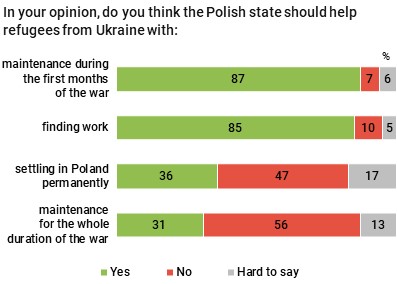25/2022
2022-08-12
How Should Poland Support Refugees from Ukraine?
In the CBOS July survey Poles were asked about what kind of help they thought their state should offer refugees from Ukraine. A decided majority of respondents said refugees should be helped with maintenance during the first months of the war (87%) and with finding work in Poland (85%). As for help with settling in Poland permanently, opinions were divided, but with more respondents being against this (47%) than in favour (36%). Likewise a majority of those surveyed (56%) thought the state should not give refugees maintenance support for the whole duration of the war, with 31% being of the opposite view. Of course nobody knows how long the war will last, or even when its ‘first months’ will come to an end – months during which, in the opinion of the decided majority of respondents, refugees should be supported by the state. However, taking into account the clear approval for helping them to find work, it would be safe to assume that the majority of Polish people expect refugees to become self-supporting as quickly as possible.

|
The minority view that Poland should give refugees maintenance support for the whole duration of the war occurred more frequently among older respondents, inhabitants of the biggest cities and people taking part in religious practices several times a week. Interestingly, when it came to social and work classification, this opinion was particularly noticeable among pensioners and people on disability or unemployment benefits – people who, at least theoretically, could themselves count on financial provision from the state.
More on this subject in the CBOS report.
This ‘Current Events and Problems’ survey (387) was conducted using a mixed-mode procedure on a representative sample of named adult residents of Poland, randomly selected from the National Identity Number (PESEL) register. Respondents independently selected one of the following methods: Computer Assisted Personal Interview (CAPI); Computer Assisted Telephone Interview (CATI), respondents receiving researchers’ telephone numbers in an introductory letter from CBOS; Computer Assisted Web Interview (CAWI), where respondents filled in the online questionnaire independently, gaining access by means of a login and password provided in an introductory letter from CBOS. In all three cases the questionnaire had the same structure and comprised the same questions. The survey was carried out between 27 June and 7 July 2022 inclusive on a sample of 1084 people (62.1% using the CAPI method, 23.4% CATI and 14.5% CAWI). CBOS has been conducting statutory research using the above procedure since May 2020, stating in each case the percentage of personal, telephone and internet interviews.





